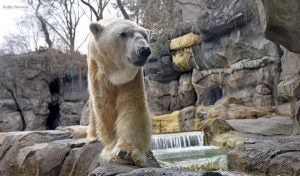America’s second oldest polar bear dies after outliving average life span by 10 years
Little One was euthanised at age 31 with chronic health issues

The second oldest male polar bear in the United States has died after outliving the average lifespan by ten years.
Cincinnati Zoo announced that the 31-yer-old bear, known as Little One, was euthanized because of chronic health issues.
The bear, who moved to Cincinnati Zoo in 2007, significantly outlived the median life expectancy for the species of 21 years.
“He was a geriatric bear with chronic medical conditions that were being managed by his animal care and veterinary teams,” the Cincinnati Zoo said in a statement.
“Little One’s longevity can be attributed to the excellent care he received.
Read more:
“The bear team provided daily enrichment, a nutritious diet specifically designed for a geriatric bear, and a comfortable environment inside and out.”
Little One was born at the Cleveland Zoo to parents Snowball and Nauyat on 13 December 1989, but despite being matched with several partners never had his own offspring.
“Over my 30 plus year career, I’ve had the privilege of caring for 17 polar bears in two zoos. All of them have been amazing animals to care for,” said Cincinnati Zoo’s head bear keeper Lisa Vollmer.
“Saying goodbye is always hard, and it was especially hard with Little One. He was one of the most easy going bears I’ve ever worked with and had a great disposition.
“His passing leaves a huge hole in hearts of all of us who cared for him. Rest in peace Little One. We love you and you will be missed.”
Conservation experts estimate that there are only around 26,000 polar bears remaining in the wild and they are listed as a “vulnerable species” because of the climate crisis and loss of Arctic sea ice.
Subscribe to Independent Premium to bookmark this article
Want to bookmark your favourite articles and stories to read or reference later? Start your Independent Premium subscription today.

Join our commenting forum
Join thought-provoking conversations, follow other Independent readers and see their replies